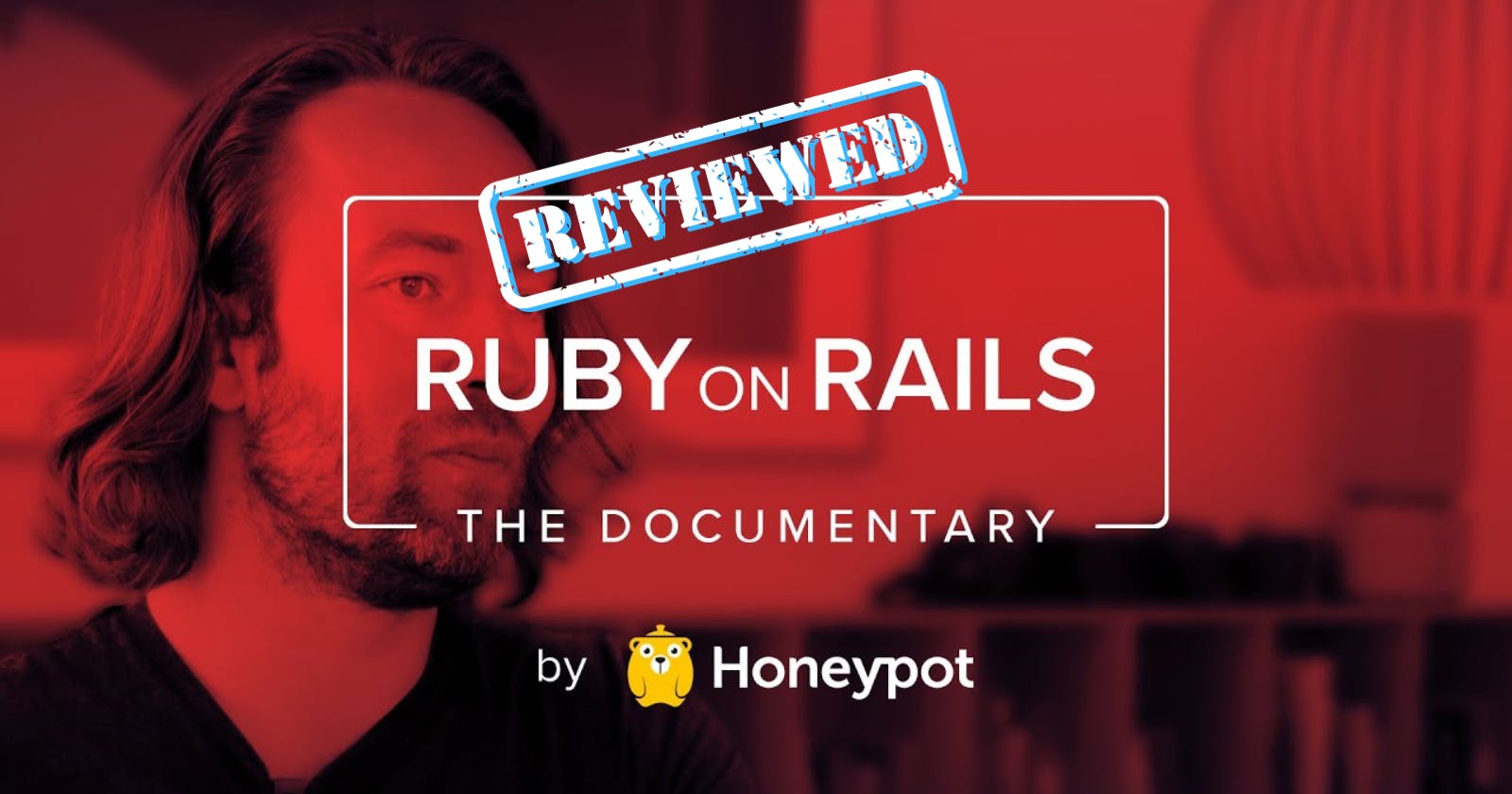I've just finished watching the premiere of the Rails documentary. Excited to be one of the first viewers. I must admit the high quality of all the videos made by Honeypot. No doubt, they are like Netflix in the programming world.
I've been working with Rails for the last 10+ years. It changed my life completely. I fell in love with it from the first time I saw it. As DHH said in the video, it's like plain English.
I saw the code and it looked just like pseudo-code. You know how if you're trying to explain a programming concept, sometimes you won't write the exact right syntax. You'll just write something that more looks like English. And that's exactly what Ruby looked like.
DHH
I decided to write this review because the video deeply touched me. The warm feeling from deep inside of my heart forces me to put my fingers on the keyboard.
Below you can find a quick summary. I mean it. Quite short. So if you were about to find a full text version of it, it's not the place. Better leave now 😁 I won't write down everything in the video though. I want you to go and actually see the brilliant 🙂 After it, I'm going to share my favorite phrases from it and some of my reflections on them.
Long story short
The story tells how Jason Fried (co-founder and CEO of 37signals) met with DHH. To raise your interest: one blog post changed everything. Also, you'll learn how David started programming and got his first Mac. Turned out he wasn't born with ActiveSupport inside of his head. How did people learn about Rails, and what role did conferences play in the process? How capistrano was born? What were the first crucial Rails milestones? Also, there are a lot of reflections around the great Rails community, David's vision and Open Source. For sure, "Rails does not scale" was mentioned too. Again, it is worth watching!
I like how emotional it was. How participants revealed the process of creating this piece of art: Rails. Also, in the Q&A session which was right after the premiere, I finally learned why the framework named "Ruby on Rails". I can write it here but why? Let me give you the pleasure of getting to know it yourself. Just need to keep an eye on the Honeypot YouTube channel as the Q&A session will be uploaded there sometime soon.
My favorite phrases from the video
Ruby was the language that gave those ideas wings, where I thought I could write code that wasn't just functioning, but it was beautiful.
DHH
I'm 100% agree. That's the reason why I hate when IT recruiters don't put primary technology on the job title or at least in the first two lines of a description. Yes, I know JavaScript. Yes, I can do a little bit of Go, Elixir, Python, Node.js, Frontend, etc. But I don't want to spend my life debugging weird issues like undefined is not a function and trying to find a place where it's actually coming from. I want to build business logic. I want to be effective at my work. Every day I want to feel I made a meaningful impact on my work. And I believe I can have it only in Ruby. Just because the whole ecosystem is built to make a developer happy. Moreover, it has a solid community, that doesn't split for 100 different packages approaching the same thing.
Another two by Tobias Lütke:
I just realized my brain has been running on Ruby since I started first programming.
Oh, what a feeling! Those fancy circle brackets, semicolumns, weird PL constructions, etc. etc. - how much it is different from what I've used to during those 10 years with Ruby. I just think in English and code it. That's it. I just think in terms of business logic, not trying to reinvent the wheel every time I do my job. That costs a fortune!
Everyone else who was building online stores had a team of 100 people and yet I was more productive. That's the difference of effectiveness, of what Rails did and it made it possible to build systems alone again.
Can't agree more. People often confuse effectiveness and busyness. You can be a very busy person but your effectiveness could be very low. And it works vice versa too! Jeff Besos, Mark Zuckerberg, Elon Musk - they are not just busy with their work. They are productive.
I like to think about it as ROI in start-up terms (Return on Investment). How much money did you invest in this marketing campaign? What output did you achieve? Did you hit your goals? If some technology can process more requests per second, that does not mean it's better than Rails. If you make performance your primary goal, you can be trapped in a premature optimization. Most likely, your project even won't get the initial traction.
My favorite phrases from the Q&A session:
Ruby is a programmer's best friend.
DHH
While Ruby's primary focus is developer happiness and not performance, I think two important things keep getting lost while discussing it:
1) Modern computers can handle so much more. Even very basic VPS can handle 1000s of requests per hour. When your user base grows so big that you need a bigger scale, you probably can afford better services. While MVP development would be much, much faster on Rails.
2) You should not underestimate what a happy developer can create for you. That's important, I'll repeat: you should not underestimate what a happy developer can create for you. A happy developer is focused on the project itself: on the business logic, on user interactions, and on how to integrate new features in the most effective, smooth way. An unhappy developer is focused on how to get home earlier, how to deal with that complex part of the code, written by someone else in the team, but business logic. It's important - we're not machines.
Simplicity is a feature. It's hard to create simple things.
Tobias Lütke
When I've heard this, I remembered a famous quote from Woody Guthrie:
Any fool can make something complicated. It takes a genius to make it simple.
Now, go watch the video, if you haven't done it already: https://www.youtube.com/watch?v=HDKUEXBF3B4

